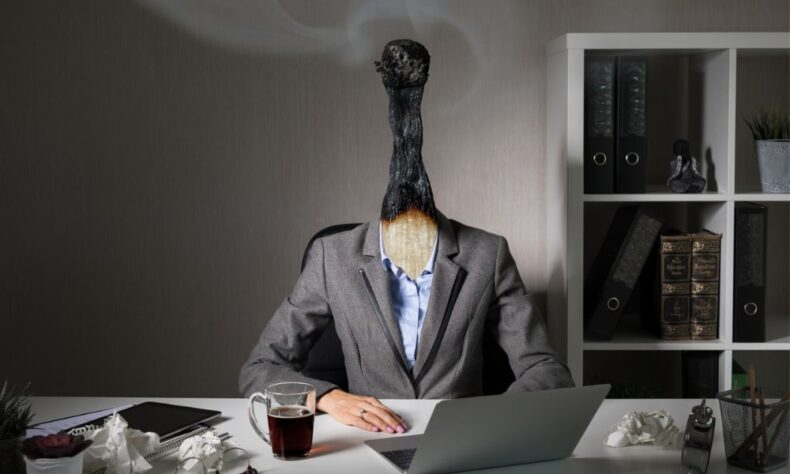
What is Job Burnout?
Job burnout is work-related stress. It is a feeling of emotional and physical exhaustion, and one might also feel a loss of self and poor professional self-esteem. Burnout isn’t a standard medical term, but some professionals link it with depression. Many researchers have pointed out that individual personality traits and family life could be responsible for job burnout. Job burnout is very bad for your mental and physical health.
Why is job burnout not talked about?
It has been observed that the realization of job burnout comes too late in one’s life. Whenever a person experiences a heart attack or a stroke, they say it is probably due to stress and go back to things as they were. If only people had taken care of themselves, then this wouldn’t happen, said Dr. Ian Kronish, who is an associate director of the Centre for Behavioural Cardiovascular Health (CBCH) at Columbia University Irving Medical Centre in New York.

Job burnout in recent years
It has been increasing at an alarming rate in recent years, probably due to COVID-19. According to a survey by indeed.com in 2021, 52% of the workers were experiencing job burnout, which is 9% more than pre-pandemic.
Tené Lewis, who is an associate professor of epidemiology at the Rollins School of Public Health at Emory University in Atlanta, said that job burnout is real and it is visible a lot these days. It is bad for your heart, blood pressure, and brain. People are more stressed and overwhelmed from every direction.
One good thing that has happened is that the World Health Organization (WHO) has classified this problem as an “Occupational Phenomenon”, meaning that it is chronic work-related stress that has not been managed successfully.
If we recall, the “great resignation” that has been going on for some time now is the direct result of job burnout. Dr. Vivek Murthy, who is a surgeon general in the U.S., said that due to this, there has been a staff shortage of health workers, which in turn resulted in the decline of the entire public healthcare system. He also said that if we fail to act, then our entire nation’s health will be at risk.
Read more: https://tdznkwjt9mxt6p1p8657.cleaver.live/mangka-mayanglambam-indian-folk-music/
Research and findings regarding job burnout
In 2017, a study in PLOS ONE reviewed decades of research and found that job burnout has been linked with many health problems like coronary heart disease, Type 2 diabetes, high cholesterol, depressive symptoms, and insomnia.
Besides these factors, it can lead to unhealthy habits which can lead to dangers like smoking and drinking, which in turn lead to atherosclerosis. “It is a condition in which plaque builds up in the arteries which in turn can lead to a heart attack or stroke.”
Many researchers have said that before working on our burnout, we should recognise it first. Only then will we be able to prevent it.

Symptoms of Job Burnout
Let’s look at some of the signs of burnout:
- The first sign is that you are feeling overwhelmed or underappreciated.
- Are you getting frequent headaches that you normally wouldn’t get?
- Are you feeling irritated and not stable and consistent like you usually are?
- Are you making more mistakes than you normally make?
These are all the signs of job burnout.
Read more: https://tdznkwjt9mxt6p1p8657.cleaver.live/actress-angela-lansbury-meets-her-demise-at-96/
Remedies for job burnout:-
- The first step should be to evaluate your options. You can discuss this with your supervisor regarding your job role and concerns so that there is mutual understanding and compromise. Try to prioritize your work accordingly.
- The second step should be to seek help. Don’t be shy about asking your co-workers, friends, or loved ones for their support. This is probably the most important thing you can do. Sharing your problem and asking for help does wonder if your companion is understanding and a good listener. You could do the same for others.
- Thirdly, you should try something relaxing, like doing something that you enjoy to release pent-up stress. Try doing yoga, meditation, or even tai-chi, as they are really good stress relievers.
- The fourth step, is something many people might not like i.e. Because when you exercise, your body’s cortisol, which is a stress hormone, drops, and your serotonin The feel-good hormone

- The fifth step is Sleep. Try and get as much sleep as possible, as it naturally restores your well-being and protects your health.
- The last step, which is probably the hardest, is mindfulness. It is an act of focusing your breath and minding your surroundings, being one with yourself without interruption and judgment. This practice will help you face any situation in your workplace with patience and openness, without any judgment.
These are some of the options that anyone could try, and if you do, I’ll suggest you be patient with yourself and your faith and everything will work out as it should.













